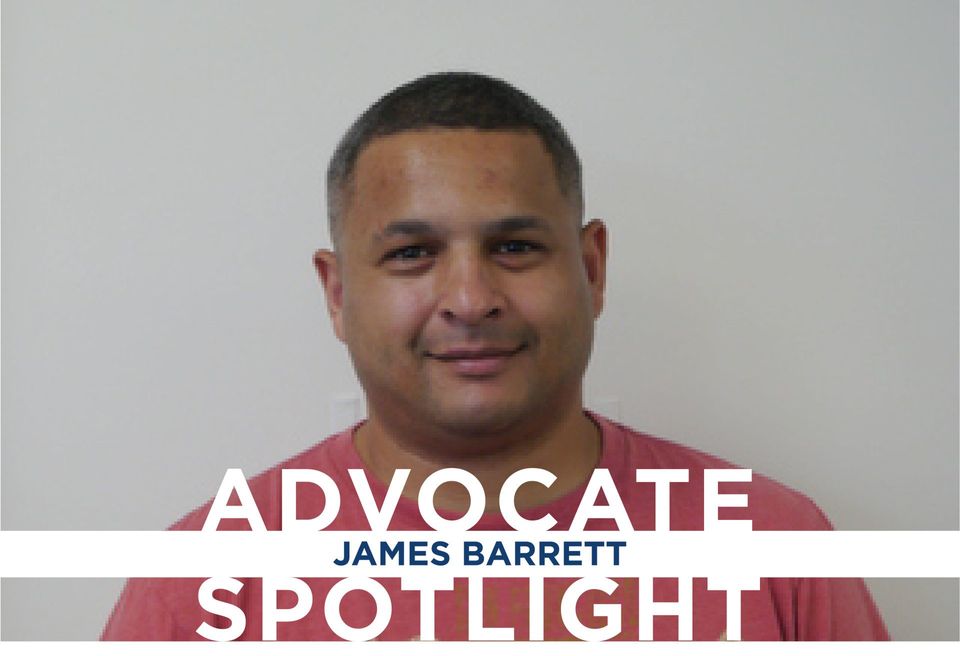Advocate Spotlight: James Barrett
October Advocate Interview

1. How long have you been an Advocate and when did you realize you wanted to become one?
I have been an advocate for going on three years now. I decided to join C.A.S.A. in August of 2016. I have been involved with you before volunteering with the Big Brother program while stationed with the Army in El Paso, Texas. However, because I myself was in the foster care system while growing up I knew that I wanted to serve foster kids and volunteer in other ways. I cannot recall the first time I hear of C.A.S.A. but it was probably in my first semester of training to become a social worker right before I retired from the Army. I mentioned it to my wife and she told me that her mom had actually done it before in El Paso, Texas. I figured no better time than now and how much better could I have become if I had a C.A.S.A. when I was going through the system.
2. What is the most rewarding aspect of being an Advocate?
The most rewarding aspect of being an advocate would be seeing the progress a young child makes. The progress could be simple to us but to them it is huge. I have had the opportunity to see children leave a treatment facility for the first time in two years to simply go bowling, young children go to great adoptive homes, and sibling groups get reunited. Sometimes a child may regress and then progress. To me this is the most rewarding part of being a C.A.S.A. is see how wonderfully children can bounce back from the negatives in our world with a caring adult that promises to stick by them.
3. If you could offer words of encouragement to your fellow and incoming Advocates, what would they be?
The best advice I can give is to always be there for the children. Sometimes what is best for the children is not what they want to hear. If they know you are there for them, they will take to you. Sometimes depending on age and circumstances this may take some time. Be willing to put in the time and effort it takes to “win over” the child. Remember who this child is, what they like, who they like, and what they want to be when they grow up. Little things like a child’s favorite color and favorite super hero will go a long way to helping securing a child’s trust.

In November 2025, Child Protective Services received a referral involving two sisters, ages 13 and 14, who were found caring for themselves. Following the death of their father, the girls experienced ongoing abuse and neglect. They were living in unsafe and unsanitary conditions, frequently left alone without adequate food, functioning plumbing, or consistent supervision, and were exposed to strangers regularly coming in and out of the home. Shortly after removal, Tameka Woolfolk was appointed as the Advocate on the case. From the very beginning, Tameka became one of the few consistent and reliable adults in the girls’ lives. The children experienced and continue to endure placement changes. These frequent transitions created ongoing instability and further complicated the girls’ ability to heal and adjust. Throughout each move, Tameka remained steadily involved, working diligently to ensure that the children’s services and support continued without interruption. She supports the girls not only emotionally, but physically as well helping pack their belongings at each move, accompanying them during school tours, and remaining readily available whenever they need support. Neither child was initially aware that they had the right to speak directly with the judge. Tameka recognized the importance of their voices being heard and with the support of the Ad Litem, helped to facilitate their presence at court, requesting that the judge meet with the girls in a breakout room, so they could personally express their wishes, all with the department, CASA and the Ad Litem by their side. In addition, this case was referred to Collaborative Family Engagement (CFE). During CASA’s ongoing exploration for family connections alongside the Department, Tameka discovered the children’s father’s obituary. Through this discovery, it was learned that the girls’ father had served in the United States Army as a combat medic during the Vietnam War and later worked for 30 years in civil service. Tameka took the initiative to request documentation, including VA records and a death certificate, to determine whether the children might be eligible for survivor benefits. The obituary also revealed that the girls are two of fourteen siblings. While many of the siblings were unable to provide support, CASA and the Department were able to establish contact with one brother. Through Tameka’s strong collaborative relationship with the Department and the Attorney Ad Litem, a thoughtful and appropriate plan was developed to allow the girls to begin visits with their brother, his wife, and their cousins. Although this story is still unfolding, both girls know one unwavering belief, that no matter what comes next, they know that Miss Tameka will continue to stand beside them every step of the way.







